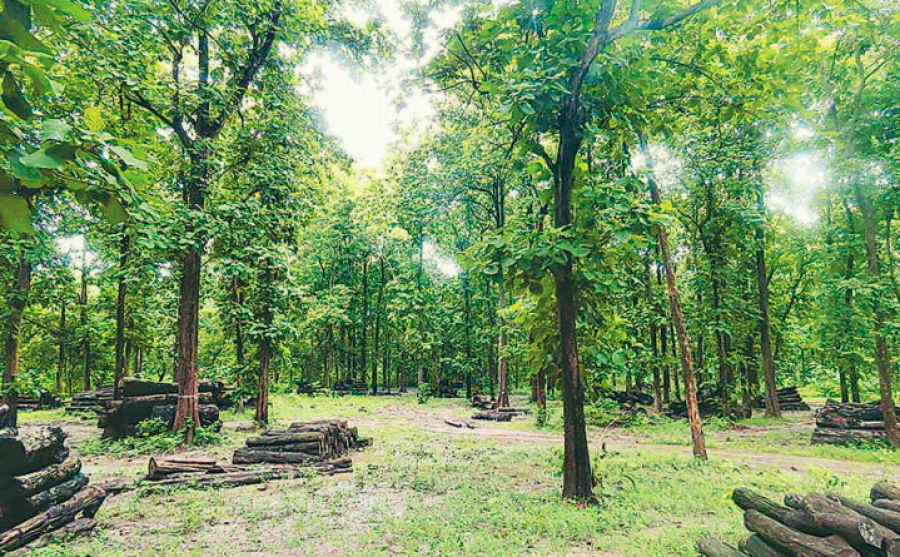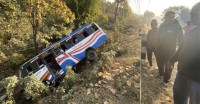National
Decision to prepare an 'updated' master plan for Nijgadh airport meets with criticism
A detailed feasibility study prepared by a South Korean firm in 2011 is good enough and there is no need to prepare a new plan at this time, officials say.
Sangam Prasain
The Tourism Ministry has directed the Civil Aviation Authority of Nepal to select a consultant to prepare an 'updated' master plan for the proposed Nijgadh International Airport, indicating that it doubts potential builder Zurich Airport International AG will come up with a business plan as promised, officials privy to the matter said.
The move comes on the heels of a directive given by a high-level government panel to the Investment Board Nepal to confirm the final investment decision with the Swiss firm by September 30.
Producing another master plan will put an ‘unnecessary’ financial burden on the government running into millions, according to at least four retired and incumbent officials at the country’s civil aviation body.
“The urgency to prepare the master plan shows that the ministry is not confident that Zurich will submit its business proposal by September 30,” an official told the Post on condition of anonymity because he was not allowed to speak to the media. “This means the government will make the investment if Zurich does not come on board.”
Zurich Airport International was named concessionaire in September last year to develop the $3.45 billion Nijgadh International Airport after the Swiss company outbid competitors, including the GMR Group, an Indian infrastructure giant.
Since the investment board has not shortlisted other bidders, no other candidate can be chosen if Zurich pulls out.
“The process has to be completely new,” said the official.
The officials, retired and incumbent, at the civil aviation body, who spoke only on condition of anonymity, said that there was no need to prepare a master plan by spending millions of rupees at this time.
The Post could not verify the actual amount the Civil Aviation Authority of Nepal was spending to prepare the master plan. It has a detailed feasibility study conducted in 2011 which is valued at Rs700 million in today’s rupees.
The inter-agency project coordination and facilitation committee headed by Tourism Minister Yogesh Bhattarai had on September 8 asked Investment Board Nepal to confirm the final investment decision on the airport with Zurich Airport.
The proposed airport in Bara, slated to become the largest airport in terms of area in South Asia, has been embroiled in controversy over its environmental impacts.
After the Supreme Court ordered a halt to felling trees at the construction site last December, Zurich Airport asked for an extension to its March 1 deadline to submit a business proposal.
The airport master plan represents the airport's blueprint for long-term development.
The master plan is essentially a facility planning study that sets forth a conceptual framework for possible future airport development. Many airports prepare a new airport master plan every 10 years.
The goal of the master plan is to provide the framework needed to guide future airport development that will cost-effectively satisfy aviation demand, while considering potential environmental and socioeconomic issues.
“Yes, we have one detailed feasibility study prepared in 2011, but the study report has become obsolete now,” said Pradeep Adhikari, chief of the national pride projects under the Civil Aviation Authority of Nepal, which oversees three ongoing international airport projects.
He said that the 'updated' master plan would incorporate all old and new documents and produce a new one, which will help to prepare the phase-wise development of the project. “But it will take time to appoint a consultant.”
In 2018, the Civil Aviation Authority had started work to prepare an airport master plan and detailed design of the first phase of Nijgadh airport, but the scheme landed in controversy over potential misuse of around Rs700 million. It was then suspended as officials feared it might attract the attention of the anti-graft body.
Again in January this year, the national pride project under the authority invited expressions of interest from potential consultants for the preparation of an updated master plan of Nijgadh International Airport. But this time, the authority decided not to include the detailed design component. The detailed design is normally prepared by the company that wins the project contract.
“This is not the proper time to prepare a master plan that requires a large amount of money. A master plan is required, but not now,” said Tri Ratna Manandhar, former director general of the Civil Aviation Authority of Nepal. “Let the airport construction plan first get concrete shape because spending money on paperwork is not a wise decision.”
Some officials at the Tourism Ministry say that preparing detailed project reports, survey reports and master plans has become “a big business” because no one raises questions about them.
“Millions of rupees are spent under such headings with no one questioning whether it is required or not," a ministry official told the Post requesting anonymity because he feared reprisals. “The master plan of Nijgadh airport is just another paper to misuse funds.”
Ever since Bhattarai was appointed the tourism minister in August last year, Nijgadh airport has been his priority. Though his appointment was hailed by many, Bhattarai has largely failed on multiple fronts and earned criticism for some of his irresponsible statements.
An airport at Nijgadh was first thought about two and a half decades ago. But the idea remained on the drawing board for years.
After the project was revived, South Korea’s Landmark Worldwide Company had submitted a detailed feasibility study to the government in August 2011. The government has not even reimbursed Rs700 million, the amount computed after adjusting for inflation, interest and opportunity cost, to the Korean company.
"The detailed feasibility study needs to be updated, but that is done by the company which wins the project contract," said former tourism secretary Birendra Bahadur Deuja. “The Korean report is adequate right now because it just needs a slight review, so there is no need to prepare another report.”
He said that making reports one after another just pushes the airport development process into uncertainties.
“If the government is negotiating with the Swiss company, there is no need to draft a master plan as the study prepared by the Korean company is enough for them to start work,” said Deuja. “They will prepare their own detailed project report and plan if they decide to invest in the project.”




 22.37°C Kathmandu
22.37°C Kathmandu














